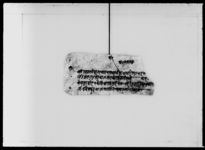A purjī from Garuḍadhvaja Pā̃ḍe ordering the provision of wheat to Suravīra (VS 1978)
ID: E_2778_0007
Edited and
translated by Surabhi Pudasaini
in collaboration with
Pabitra Bajracharya
Created: 2022-07-19;
Last modified: 2022-12-31
For the metadata of the document, click here
The accompanying edition, translation/synopsis and/or commentary are available under the terms of the Creative Commons Attribution-ShareAlike 4.0 International License
Abstract
This purjī from the kaparadāra Garuḍadhvaja Pā̃ḍe orders the aḍais Rājabala Ḍoṭyāla and Ramānātha Pādhyā to provide wheat to Suravīra, a keṭā serving the king.Diplomatic edition
[1]
1⟪7⟫1⟪[?]⟫1श्री\1श्री५महाराजा1अडैराजवलडोट्यालरमानाथपाध्याकेश्रीकपर्दारगरुडध्वजपा[...][...]2र्जिउप्रांतलुभुसेराका७८सालकोगहुवालीमध्ये¯ ¯ ¯का[...][...]
3केटासुरवीर१केसिधागहुमुरि१।१०भरिदेउवहिवुझ्दामोजराप
4र्लाइतिसम्वत१८७८सालमितिआषाडवदी१रोज७शुभ्म्¯¯¯ ¯¯¯ ¯¯¯ ¯¯¯ ¯¯¯ ¯¯¯ ¯¯¯ ¯¯¯
Translation
[1r]
7
To the aḍais Rājabala Ḍoṭyāla [and] Ramānātha Pādhyā
A purjī from Śrī KaparadāraGaruḍadhvaja Pāḍe
Uprānta: From the wheat crop (bālī) of the year 78 from the [lands comprising the] Lubhuserā, disburse 1 murī, 10 [pāthīs] of wheat for 1 keṭā, Suravīra, who serves [Śrī 5 Mahārājā]1 . When the accounts are cleared, a deduction will be granted.
Saturday, the first of the dark fortnight of Āṣāḍha, in the [Vikrama] era 1878 (1821 CE). May it be auspicious.
Commentary
This is a note from the kaparadāra Garuḍadhvaja Pā̃ḍe ordering two aḍais to provide wheat to Suravīra, who was serving the king. It is one of ten documents (E_2778_0001 to E_2778_0010) recording the distribution of wheat to various people working within the Hanumānḍhokā palace complex. All the orders date to VS 1878 and relate to the wheat crop of Lubhu serā land in that year. This is the only one of the ten orders where the person receiving the wheat is explicitly identified as a keṭā. The meaning of the term as used here is not exactly clear. It literally denotes an unmarried male juvenile, but it was often used to refer to male slaves.
Savāla 3 of RRC_0024_0776, laying out Bhoṭu Pā̃ḍe’s duties as kaparadāra in VS 1859, confirms that the kaparadāra was responsible for ascertaining the amount of foodgrains that palace servants received. Garuḍadhvaja Pā̃ḍe appears to be fulfilling that duty here. The ten directives were issued over the course of three months from Jeṭh to Bhadau. Ascertaining the amount of foodgrains that individual palace servants received was, therefore, not a task concluded in parallel. Rather, the amounts were reviewed and confirmed serially.
Garuḍadhvaja was kaparadāra from the early VS 1870s till the early 1890s. He was a son of the former kaparadāra Bhoṭu Pā̃ḍe (see Pā̃de Chetrī 1977: 246). Though the authority to ascertain amounts rested with the kaparadāra, the orders were carried out by two aḍais, Rājabala Ḍoṭyāla and Ramānātha Pādhyā. Aḍais were employed at the Koṭa Bhaṇḍāra, which managed the stores of foodstuffs within the royal palace complex. Each serā was also put under the management of one or a pair of aḍais.2 Outside the current ten documents, Rājabala Ḍoṭyāla appears again in relation to Lubhu serā [land] in VS 1880 in E_2764_0046.

